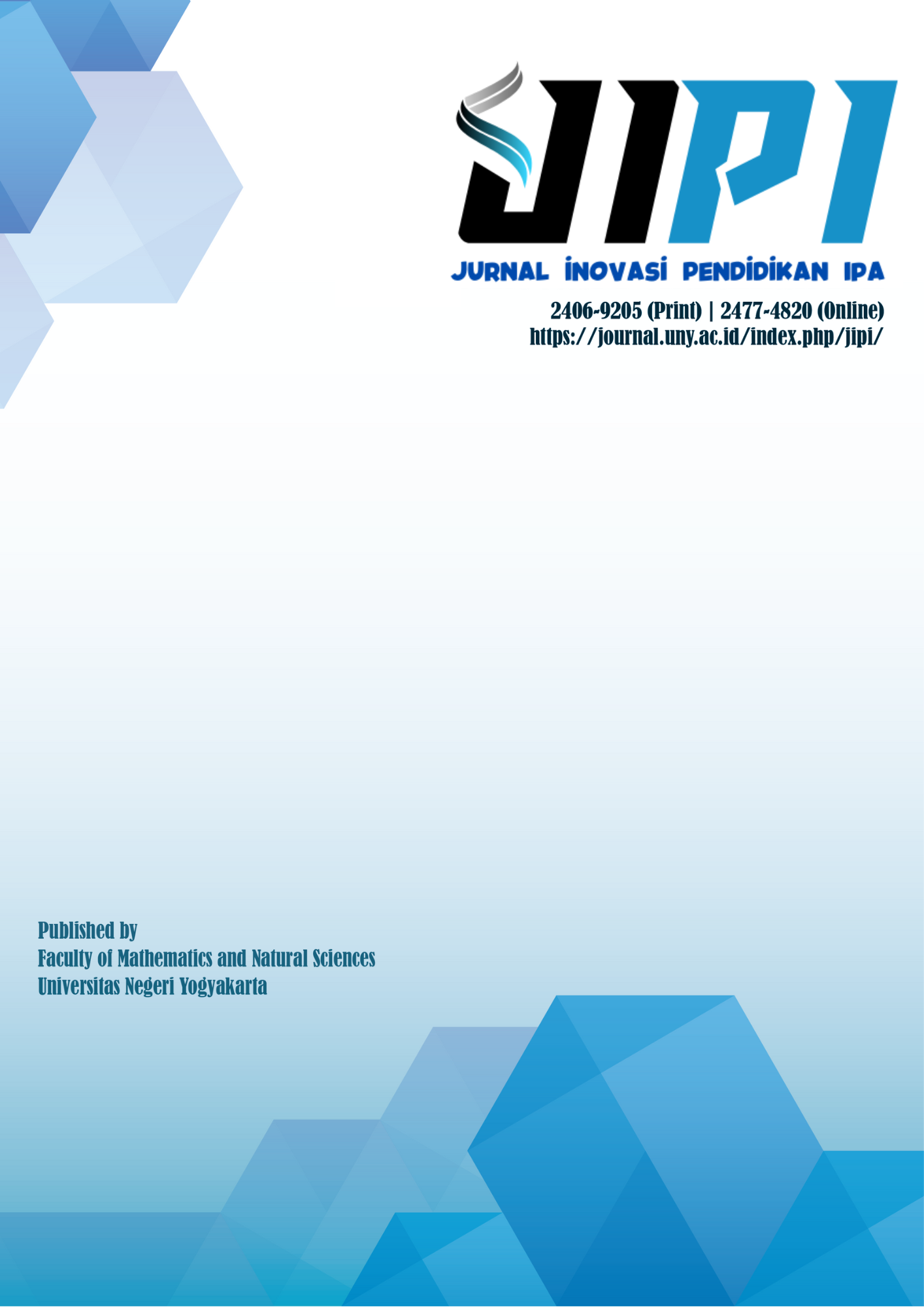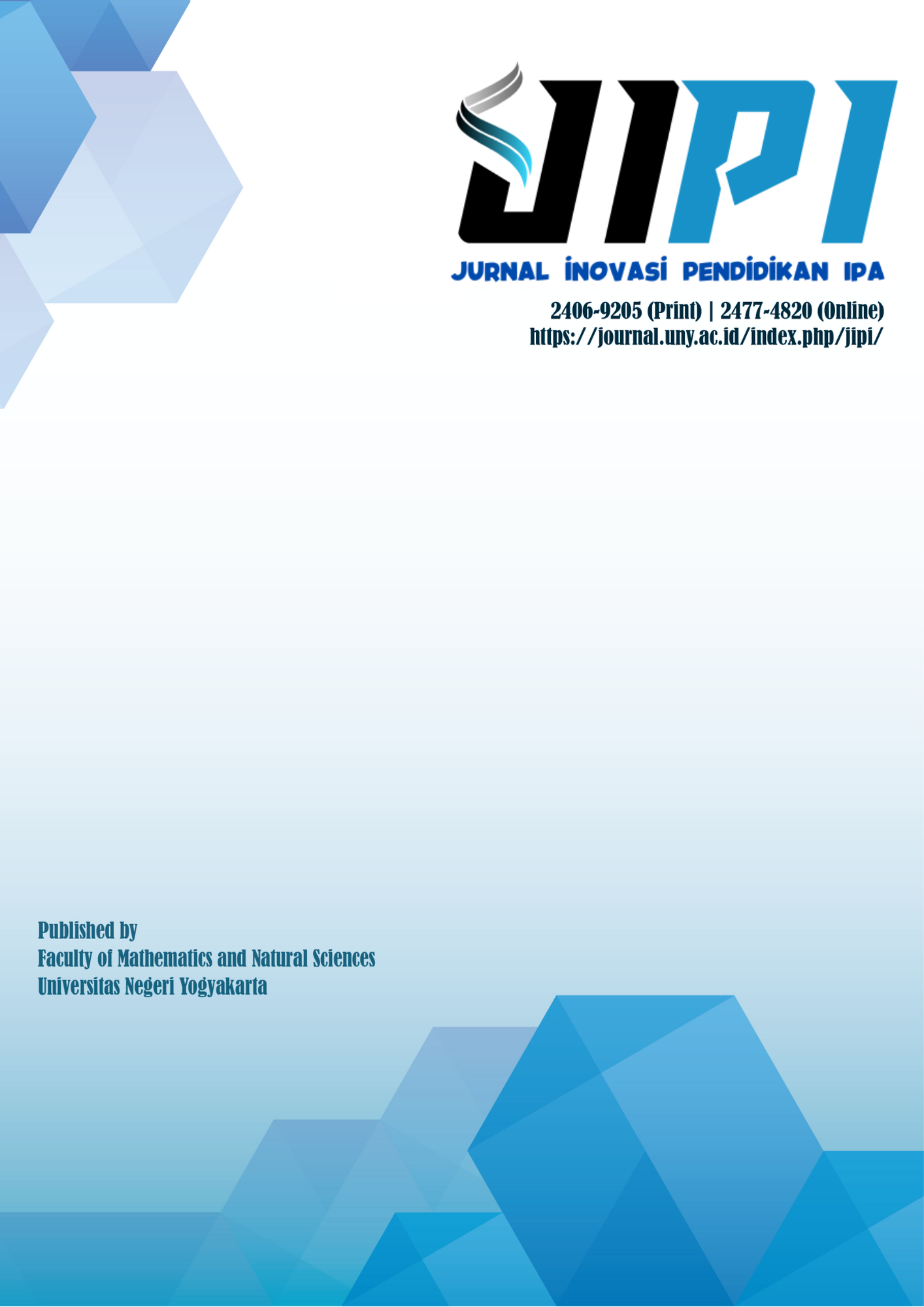Effect of Learning Intervention on the Improvement of Students' Questioning Skills in Physics Learning
DOI:
https://doi.org/10.21831/jipi.v11i2.86425Keywords:
physics learning intervention, problem-based learning, questioning abilityAbstract
This study aims to reveal the effect of a learning intervention on the questioning ability in physics learning of the students of SMA Negeri 1 Kuta Baro. Employing a quantitative approach with a nonequivalent control group quasi-experimental design, the research involved 84 students, comprising 41 students in the experimental group (Classes X-1 and XI-1) and 43 students in the control group (Classes X-2 and XI-2). The learning intervention in the experimental class integrated the problem-based learning (PBL) model, teacher-student question-and-answer interactions, collaborative group discussions, and inter-group Q&A sessions. The research results showed that the learning intervention significantly and substantially enhanced students' questioning ability, as measured by the dimensions of questioning skills, including clarity, focus, conciseness, depth of information, and cognitive level. There was a 27.56% increase in the quantity of written questions in the experimental class, far exceeding the 7.9% increase in the control class. Although the quantity of oral questions increased in the experimental class, the cognitive level of oral questions in both groups remained low; however, their effectiveness (clarity and focus) was categorized as high. Overall, the learning intervention proved effective in facilitating the development of students' questioning skills, although further strategies were still needed to encourage questions at higher cognitive levels. Further follow-up is required to enhance students' oral questioning ability at the mental level by improving their prior knowledge of the subject matter and critical thinking skills
References
Aryanti, E., Jumhur, & Habisukan, U. H. (2020). Analisis keterampilan bertanya peserta didik pada model Problem based learning mata pelajaran biologi di SMA Nurul Iman Palembang. Jurnal Biologi Edukasi, 11(2), 1–8. DOI: https://doi.org/10.24815/jbe.v11i2.17166
Caton, J. B., Chung, S., Adeniji, N., Hom, J., Brar, K., Gallant, A., Bryant, M., Hain, A., Basaviah, P., & Hosamani, P. (2021). Student engagement in the online classroom: comparing preclinical medical student question-asking behaviors in a videoconference versus in-person learning environment. FASEB BioAdvances, 3(2), 110–117. https://doi.org/DOI:10.1096/fba.2020-00089
Chung, K. L., Khe, F. H., & Morris, S. J. (2024). The influence of ChatGPT on student engagement: A systematic review and future research agenda . Computers & Education, 219(105100), 1–21. https://doi.org/10.1016/j.compedu.2024.105100
Evendi, Susantini, E., Wasis, & Prahani, B. K. (2018). Improving Students’ Scientific Asking Skills through the Implementation of Question Webs Based Learning Model. In Journal of Physics: Conference Series. IOP Publishing., 1108(1), 1–6. https://doi.org/doi :10.1088/1742-6596/1108/1/012037
Hafizo, R., Lian, B., & Jayanti. (2022). Analisis Keterampilan Bertanya Siswa pada Pembelajaran Matematika Kelas IV Sekolah Dasar . JOTE:Journal On Teacher Education, 4(1), 202–211. https://doi.org/https://doi.org/10.31004/jote.v4i1.5644
Indriyani, S., & Rohita. (2019). Penguasaan keterampilan bertanya dasar di TK baiturrahman. Jurnal Audhi, 2(1), 1–11. https://doi.org/http://dx.doi.org/10.36722/jaudhi.v2i1.575
Ishtiaq, M., & Gul, R. (2024). Factors Affecting the Questioning Ability of Neophyte Undergraduate Nursing Students in the Classroom. Health Professions Education, 10(3), 192–201. https://doi.org/DOI:10.55890/2452-3011.1287
Islamiati, A., Fitria, Y., Sukma, E., Yaswinda, Fitria, E., & Oktari, S. T. (2024). The influence of the problem based learning (PBL) model and learning style on the thinking abilities. Jurnal Penelitian Pendidikan IPA, 10(4), 1934–1940. https://doi.org/https://doi.org/10.29303/jppipa.v10i4.6219
Kunayah, D., & Fauziah, H. N. (2023). Analisis Kemampuan Bertanya Siswa Ditinjau dari Efikasi Diri. Jurnal Tadris IPA Indonesia. DOI: https://doi.org/10.21154/jtii.v3i3.2500
Muliati, B., Loka, I. N., Hakim, A., & Sofia, B. F. D. (2023). Hubungan Antara Kemampuan Bertanya Dengan Keterampilan Berpikir Kritis Materi Pokok Asam Basa Pada Siswa Kelas XII MIPA SMAN 1 Sakra Tahun Ajaran 2021/2022. Chemistry Education Practice, 6(1), 72–77. https://doi.org/10.29303/cep.v6i1.3739
Nadile, E. M., Alfonso, E., Barreiros, B. M., Bevan-Thomas, W. D., Brownell, S. E., Chin, M. R., Ferreira, I., Ford, S. A., Gin, L. E., Gomez-Rosado, J. O., Gooding, G., Heiden, A., Hutt, A. E., King, M. L., Perez, S. G., Rivera Camacho, Y. I., Salcedo, F., Sellas, C. F., Sinda, K. A., … .Cooper, K. M. (2021). Call on me! Undergraduates’ perceptions of voluntarily asking and answering questions in front of large-enrollment science classes. PLOS ONE, 16(1), 1–23. https://doi.org/10.1371/journal.pone.0243731
Navarrete-Ulloa, J. A. (2024). Learning Rates: A Correction of Gain Scores to Assess Math Learning Interventions. The Journal of Experimental Education, 1–17. https://doi.org/10.1080/00220973.2024.2352768
Nurdiansyah, Johar.R, & Saminan. (2019). Keterampilan Bertanya Guru SMP dalam Pembelajaran Matematika . Jurnal Peluang, 7(1), 44–54. DOI: https://doi.org/10.24815/jp.v7i1.13735
Nuriya, H., Prabowo, & Rahardjo. (2022). Pengembangan perangkat pembelajaran berbasis jejaring pertanyaan untuk melatihkan keterampilan proses sains pada materi suhu dan kalor. Jurnal Education and Development, 10(1), 327–334. https://doi.org/https://journal.ipts.ac.id/index.php/ED/article/view/3457
Nurhasanah, M., Suprapto, P.K., & Ardiyansyah, R. (2024). The Effectiveness of Problem-Based Learning Assisted by Articulate Storyline Interactive Students' Critical Thinking Skills. Jurnal Inovasi Pendidikan IPA, 10(1), 1-9. Doi: https://doi.org/10.21831/jipi.v10i1.64847
Putri, A.,Susilowati, E., & Mulyani, S.(2025). Socio Scientific Issue application in PBL model: Is that effective in improvingchemical literacy?Jurnal Inovasi Pendidikan IPA, 11(1), 296-307. Doi: http://dx.doi.org/10.21831/jipi.v11i1.77351
Puente, S. M. G., & Kroesen, G. M. W. (2020). Facilitating retention and transfer of physics concepts with challenging assignments in design based learning projects. Open Journal of Social Sciences, 8(12), 366–387. https://doi.org/10.4236/jss.2020.812030
Pramudiyanti, Susilo, H., Hastuti, U. S., & Lestari, U. (2019). The Efforts To Foster Students’ Skill In Making Questions Through Thinking Tool (Question Matrix) Development. Jurnal Pendidikan IPA Indonesia, 8(1), 119–128. https://doi.org/DOI:10.15294/jpii.v8i1.15347
Pratiwi, D. I., Kamilasari, N. W., Nuri, D., & Supeno. (2019). Analisis keterampilan bertanya siswa pada pembelajaran IPA materi suhu dan kolor dengan model problem based learning di SMP negeri 2 Jember. Jurnal Pembelajaran Fisika, 8(4), 269–274. https://doi.org/https://doi.org/10.19184/jpf.v8i4.15236
Prilanita, Y. N., & Sukirno. (2017). Peningkatan keterampilan bertanya siswa melalui faktor pembentuknya. Cakrawala Pendidikan, 244–256. https://doi.org/https://doi.org/10.21831/cp.v36i2.11223
Ryana, R. M., & Deci, E. L. (2020). Intrinsic and extrinsic motivation from a self-determination theory perspective: Definitions, theory, practices, and future directions. Contemporary Educational Psychology, 60(101860), 1–11. https://doi.org/https://doi.org/10.1016/j.cedpsych.2020.101860
Salamah, A. N., Erman, & Susiyawati, E. (2022). Analisis keterampilan bertanya siswa kelas VIII pada mata pelajaran IPA. Journal of Science Education, 6(3), 704–711. https://doi.org/https://doi.org/10.33369/pendipa.6.3.704-711
Supena, I., Darmuki, A., & Hariyadi, A. (2021). The influence of 4C (constructive, critical, creativity, collaborative) learning model on students’ learning outcomes. International Journal of Instruction, 14(3), 873–892. https://doi.org/10.29333/iji.2021.14351a
Toheri, T., Winarso, W., & Haqq, A. A. (2020). Where exactly for enhance critical and creative thinking: The use of problem posing or contextual learning. European Journal of Educational Research, 9(2), 877–887. https://doi.org/10.12973/eu-jer.9.2.877
Yanuardianto, E. (2019). Teori Kognitif Sosial Albert Bandura (Studi Kritis Dalam Menjawab Problem Pembelajaran di Mi). Auladuna: Jurnal Prodi Pendidikan Guru Madrasah Ibtidaiyah, 1(2), 94–111. https://doi.org/https://doi.org/10.36835/au.v1i2.235
Zuraida, F., Syamsu, F. D., & Tanjung, H. S. (2019). Analisis Ketrampilan Bertanya Siswa SMP KELAS VIII Pada materisistem pencernaan melalui pendekatan studi kasus di SMP negeri 5 seunangan. Jurnal Bionatural, 6(1), 35–44. https://doi.org/https://ejournal.uncm.ac.id/index.php/bio/article / /view/761
Downloads
Published
How to Cite
Issue
Section
Citation Check
License

This work is licensed under a Creative Commons Attribution-ShareAlike 4.0 International License.
The authors submitting a manuscript to this journal agree that, if accepted for publication, copyright publishing of the submission shall be assigned to Jurnal Inovasi Pendidikan IPA (JIPI). However, even though the journal asks for a copyright transfer, the authors retain (or are granted back) significant scholarly rights.
Jurnal Inovasi Pendidikan IPA by http://journal.uny.ac.id/index.php/jipi/index is licensed under a Creative Commons Attribution-ShareAlike 4.0 International License.










